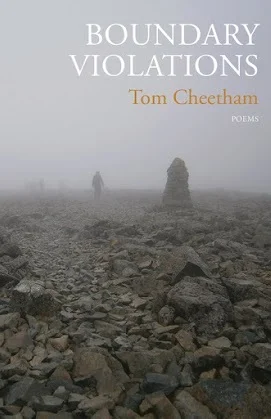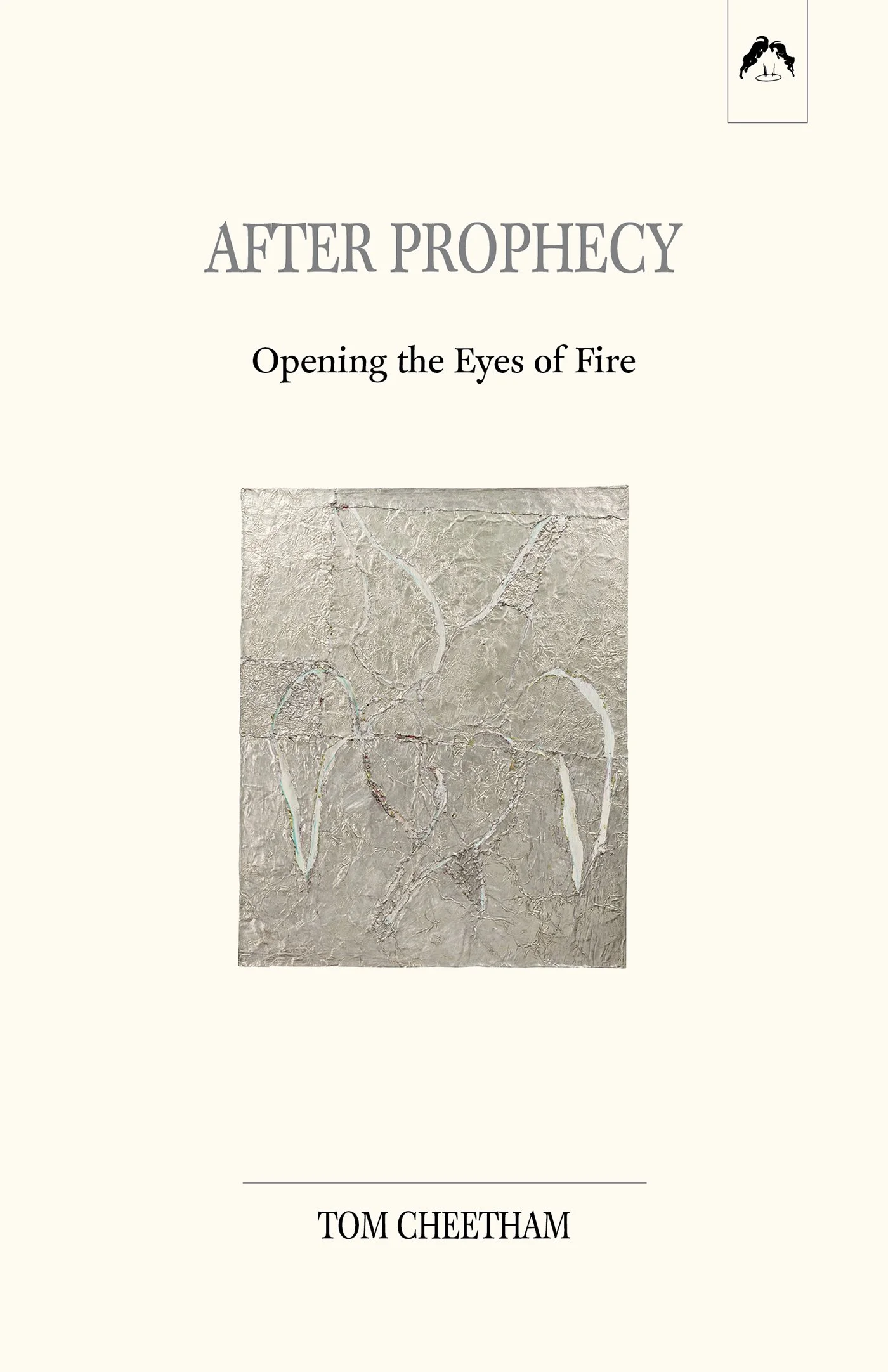It doesn’t get any more honest than this. Tom Cheetham, long known for his dedicated and engaged scholarship on Henry Corbin, here reveals another side to his lively intelligence. The poems in Boundary Violations address us to the ordinary that Emerson proposed as America’s gift to the world. Sitting at the feet of the familiar, the low, Cheetham finds himself face to face with wonder and generously leads us into its glow. - Michael Boughn
Coming from a rogue scholar of the imagination in esoteric Islam, a book of poems should be of no surprise, but this one sure is. Tom Cheetham plunges us deep into the imaginative realities of a life as far from Mecca as Maine. By turns ludic, dark, elegant, honest, with an enviable sense of the absurd, and with generosity towards existence, Cheetham is ever faithful to the turns of thought and feeling, interleaving the planes of the real into his continuous and wonderfully whacked-out song. - Joseph Donahue
There is a madcap intelligence at work in these poems, an intelligence that has given itself permission to go as far as it can. Tom Cheetham calls his book Boundary Violations (the boundaries of the voice, of the poetic line, of standard poetic discourse, of literary propriety…), but it could also be said that here, all poetic boundaries have been entirely dissolved. I encourage you to join him in observing “the mysterious energies of life exploding off the pages…” - Norman Finkelstein
Available on AMAZON
I will not forget this book. It has subtly but, I suspect, permanently shifted the way I look at reality, the way I listen to language. - Cynthia Bourgeault
Cheetham’s book is a jewel that returns us to the “wild energies of creation” through his lucid and passionate dedication to the necessity of imagination for soul. His book offers the essence of these thinkers as alchemical transformers of being in the anima mundi. Imaginal Love returns psyche to cosmos: as organ of imag(e)inging where we embody the angels. - Susan Rowland
Imaginal Love radically reframes the ancient question of the nature of love, in particular as a path for a consciously realized life. Tom Cheetham drives passionately, sympathetically, and lucidly between the intertwined yet critically antithetical paths of Henry Corbin, the great mystical French exegete of Sufi “psychocosmology,” and James Hillman, the great American heretical transformer of Jungian psychology. And he does it by way of his long personal journey, showing that any realization of “imaginal love” can only happen within the person, actual singular being. At the same time he profoundly engages the paradox that such intensively lived singularity is also the site of non-limiting multiplicity and visionary openness. It’s a vision as well of a higher function of language, implicitly a poetics of alchemical intensity, yet which can only occur within the deepening process of life itself. - George Quasha
"In a series of brilliant books, Tom Cheetham has single-handedly brought the work of Henry Corbin forward to the English-speaking world in its depth and originality. Writing in prose at once lucid and inspired, Cheetham conveys the vision of Corbin into the Persian mystical tradition in ways that kindle reflection on the part of the reader. Drawing on extensive knowledge, Cheetham accomplishes what every serious scholar of this tradition seeks: to place the mark of thought upon a living legacy." - Edward S. Casey, Distinguished Professor of Philosophy, SUNY Stony Brook and author of The World at a Glance.
"For anyone attracted to the elusive realm of creative imagination, this new book draws out and makes explicit what lives so strongly as a lure within the heart, the desire to find again our first home, the imaginal worlds and their inhabitants, the angels of creativity. As acknowledged master interpreter of the great work of Henry Corbin, Tom Cheetham follows Corbin’s path of seeing all the world as living symbol of the divine worlds. More, he shows how to go through the portal of the world as symbol to enter the imaginal realms in their intimate autonomy, and develop impeccable trust in their spontaneous appearance as personal images. Here, in this writing, we can learn interior listening, discovering the inherent poeticizing action of the word. This beautiful volume goes beyond, way beyond, any of our usual self-serving inclinations and leads us into being servants of the angel of the Earth." - Robert Sardello, Author of Silence: The Mystery of Wholeness
Cheetham’s passion for the material carries the reader into an ever-deepening appreciation of the huge importance of Henry Corbin for the re-valuation of vision and imagination. Arabic and Persian parallels and arguments with Western thinkers including Levinas, Illich and Jung are set forth clearly and fairly. It seems to me a faultless book. – James Hillman
Tom Cheetham has written a powerful book. With great talent, he shows how Henry Corbin's deep spirituality has the power to eliminate our "spiritual neediness," because it gives us what we are truly looking for: a non-literal god, a god that does not even ask to be called "God" (or "Goddess"), one that is the World, not beyond it. Cheetham's book should be required reading for all believers. He provides an alternative to the neurotic God complex that is tearing humanity apart. This book is much needed, offering a balm to wounds of the collective psyche. As an atheist who feels the divine beauty of this world, I can only applaud this reading of Corbin, who replaces belief in God with a profound capacity to perceive the harmony of the sensate world. - Ginette Paris, Pacifica Graduate Institute, Author of Wisdom of the Psyche
2nd Edition 2020
Tom Cheetham has written a remarkable book that has the power of shifting our way of imagining the world ... He is one of the most courageous thinkers I have ever read ... I hope you enter into a study of a work that certainly does not belong to the world of throwaway books. This book requires slow reading, for as you read these living words you are undergoing a transformation. At the end of reading, the world will not be the same. - from the Foreword by Robert Sardello
Nowhere does this far ranging and sophisticated survey of the loss of the world soul allow for easy summary; it is far too baroque in architecture and in thematic interests... - enough to rattle anyone's caged thoughts into new territory. One of [Cheetham's] clarion calls is to return to thinking as an imaginal act... [his] style and manner is scholarly-poetic for he calls on the reader to imagine his work with him... [He] argues that the world's languages need to be heard once more by ears grown deaf by dogma, closed by arthritic credos and waxed over by wandering abstractions that bypass the world soul's desire to be recognized on its own terms. – Dennis Patrick Slattery, Pacifica Graduate Institute, Author of The Wounded Body
A deep reading of Tom Cheetham's The World Turned Inside Out could have the effect of turning the reader inside out! Not only will a person discover in this book a thorough understanding of the remarkable and important vision of Henry Corbin, the great French scholar of Iranian Islam. The reader will also be engaged by a politically useful understanding of the religion of Islam generally, of mystical and negative theology, of monotheism, of the philosophy of imagination, of language and the textures of textuality, and of the nature of reading and thinking. Among other things, a careful reading of this book can inform current interpretations of the politics of terrorism, its wars and the wars against it. In short, there exists here a shaking of the foundations of human perspectives that comes to nothing short of a radical revisioning of all attempts to make sense of the life and meaning of being in the world. - David L. Miller, Watson-Ledden Professor of Religion, Emeritus, Syracuse University, Core Faculty Member, Pacifica Graduate Institute, Author of Christs, Three Faces of God & Hells and Holy Ghosts.
A remarkable creative synthesis of the genius of Henry Corbin, the silent precursor of archetypal psychology. Tom Cheetham gives the gift of a metaphysics of interiority balancing pervasive, destructive, suffocating, spectator consciousness. And it is a convivial interiority, filled with spiritual presences. The soul can breathe again because it has found its homeland, the Soul of the World. - Robert Sardello, author of Freeing the Soul from Fear
2nd Edition
EL MUNDO COMO ICONO . HENRY CORBIN Y LA FUNCIÓN ANGÉLICA DE LOS SERES
L’oeuvre de Henry Corbin mérite d’être beaucoup plus largement connue qu’elle ne l’est aujourd’hui. Mais ses écrits demandent, de la part du lecteur, une familiarité avec une grande variété de sujets. Il était à la fois un philosophe néo-platonicien, un théologien intéressé par les écrits d’Emmanuel Swedenborg et Johann Georg Hamann, Jacob Boehme et Martin Heidegger, et un orientaliste spécialiste de la mystique islamique. Il fut un savant de première importance, un extraordinaire linguiste, et un traducteur, éditeur et commentateur prolifique. Mais il fut plus qu’un savant. Il était l’interprète d’une forme de théologie mystique.
L'envers du monde tente de donner un contexte à l’intérieur duquel on puisse situer ses écrits, souligner quelques-unes de ses idées et des thèmes qui sont importants pour la compréhension de son oeuvre dans son ensemble, et de fournir des références pour quiconque aura l’intérêt d’approfondir le sujet. Corbin est reconnu par certains comme étant à l’origine, avec C.G. Jung, des fondements intellectuels de la psychologie archétypale.
Son attraction a souvent été au coeur de deux aspects majeurs de son travail : la redécouverte de la réalité du mundus imaginalis et son effort pour alléger l’emprise du monothéisme dogmatique sur la conscience occidentale en révélant les facettes polythéistes de la Divinité.








